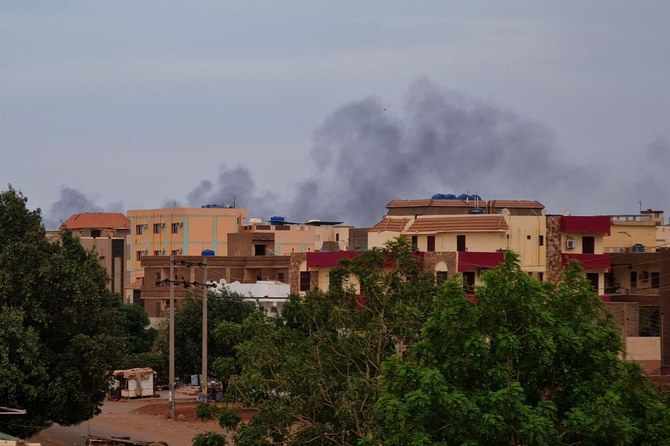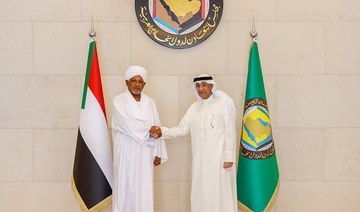CAIRO: Sudan’s army and its rival paramilitary said Sunday they will extend a humanitarian cease-fire a further 72 hours. The decision follows international pressure to allow the safe passage of civilians and aid, but the shaky truce has not so far stopped the clashes.
In statements, both sides accused the other of violations. The agreement has deescalated the fighting in some areas but violence continues to push civilians to flee. Aid groups have also struggled to get badly needed supplies into the country.
The conflict erupted on April 15 between the nation’s army and its paramilitary force, and threatens to thrust Sudan into a raging civil war. The UN warned on Sunday that the humanitarian crisis in Sudan was at “a breaking point.”
“The scale and speed of what is unfolding in Sudan is unprecedented,” the UN’s humanitarian chief Martin Griffiths said in a statement.
He said water and food are becoming increasingly hard to find in the country’s cities, especially the capital, Khartoum, and that the lack of basic medical care means many could die of preventable causes. Griffiths said that “massive looting” of aid supplies has hindered efforts to help civilians.
Earlier Sunday, an aircraft carrying eight tons of emergency medical aid landed in Sudan to resupply hospitals devastated by the fighting, according to the International Committee of the Red Cross, which organized the shipment. It arrived as the civilian death toll from the countrywide violence topped 400 and aid groups warned that the humanitarian situation was becoming increasingly dire.
More than two-thirds of hospitals in areas with active fighting are out of service, a national doctors’ association has said, citing a shortage of medical supplies, health workers, water and electricity.
The air-lifted supplies, including anesthetics, dressings, sutures and other surgical material, are enough to treat more than 1,000 people wounded in the conflict, the ICRC said. The aircraft took off earlier in the day from Jordan and safely landed in the city of Port Sudan, it said.
“The hope is to get this material to some of the most critically busy hospitals in the capital” of Khartoum and other hot spots, said Patrick Youssef, ICRC’s regional director for Africa.
The Sudan Doctors’ Syndicate, which monitors casualties, said Sunday that over the past two weeks, 425 civilians were killed and 2,091 wounded. The Sudanese Health Ministry on Saturday put the overall death toll, including fighters, at 528, with 4,500 wounded.
Some of the deadliest battles have raged across Khartoum. The fighting pits the army chief, Gen. Abdel Fattah Burhan, against Gen. Mohammed Hamdan Dagalo, the head of a paramilitary group known as the Rapid Support Forces.
The generals, both with powerful foreign backers, were allies in an October 2021 military coup that halted Sudan’s fitful transition to democracy, but they have since turned on each other.
Ordinary Sudanese have been caught in the crossfire. Tens of thousands have fled to neighboring countries, including Chad and Egypt, while others remain pinned down with dwindling supplies. Thousands of foreigners have been evacuated in airlifts and land convoys.
On Sunday, fighting continued in different parts of the capital where residents hiding in their homes reported hearing artillery fire. There have been lulls in fighting, but never a fully observed cease-fire, despite repeated attempts by international mediators.
Over the weekend, residents reported that shops were reopening and normalcy gradually returning in some areas of Khartoum as the scale of fighting dwindled after yet another shaky truce. But in other areas, terrified residents reported explosions thundering around them and fighters ransacking houses.
Youssef, the ICRC official, said the agency has been in contact with the top command of both sides to ensure that medical assistance could reach hospitals safely.
“With this news today, we are really hoping that this becomes part of a steady coordination mechanism to allow other flights to come in,” he said.
Youssef said more medical aid was ready to be flown into Khartoum pending necessary clearances and security guarantees.
Sudan’s health care system is near collapse with dozens of hospitals out of service. Multiple aid agencies have had to suspend operations and evacuated employees.
On Sunday, a second US-government organized convoy arrived in Port Sudan, said State Department Spokesperson Matthew Miller. He said the US is assisting American citizens and “others who are eligible” to leave for Saudi Arabia where US personnel are located. There were no details on how many people were in the convoy or specific assistance the US provided.
Most of the estimated 16,000 Americans believed to be in Sudan right now are dual US-Sudanese nationals. The Defense Department said in a statement on Saturday it was moving naval assets toward Sudan’s coast to support further evacuations.




















